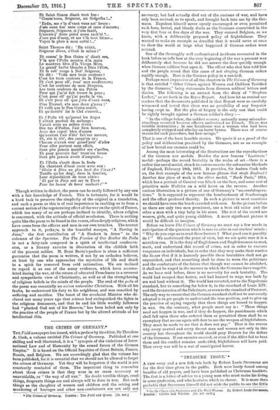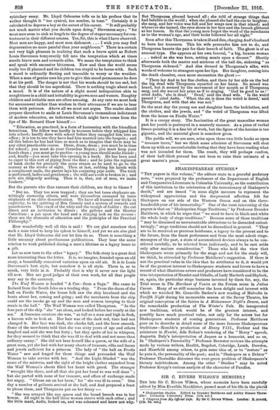" TREASURE TROVE."
A NEW essay and a new folk-tale both by Robert Louis Stevenson are for the first time given to the public. Both were lately found among bundles of old papers, and have been published as Christmas booklets. The first is a letter of advice to a young man who must make his living in some profession, and who hesitates which to choose. It is more than probable that Stevenson himself did not wish the public to see the litt!e • • On the Clioim of a Proration and The Waif Woman. By Robert Loub StevensOu. London : Chatto and 'h lodes. 11a. net each-i.
epistolary essay. Mr. Lloyd Osbourne tells us in his preface that its author thought it " too cynical, too sombre, in tone." Certainly it is calculated to depress a boy at the outset of his career. " It will probably not much matter what you decide upon doing," Stevenson says; " for most men seem to sink at length to the degree of stupor necessary for con- tentment in their different estates. Yes, Sir, this is what I have observed. Most men are happy, and most men dishonest. . . . I wish you may find degeneration no more painful than your neighbours." There is a certain not very high pleasure in realizing that such a brave spirit as Robert Louis Stevenson temporarily fell into the temptation which at times assails brave men and cowards alike. We mean the temptation to think and speak with excessive bitterness. Now and then the world seems really too ill planned and its children too stupid to be borne with. Such a mood is ordinarily fleeting and traceable to worry or the weather. When a man of genius uses his pen to give this mood permanence he does it at his peril. The danger is not that his words should be too sad, but that they should be too superficiaL There is nothing tragic about such a mood. It is of the nature of a slight moral indisposition akin to naughtiness in a child and irritability in grown men and women. Naughty children and irritable men are often amusing. At any rate we must look for amusement rather than wisdom in their utterances if we are to hear them with patience. Above all we must not argue. The reader should prepare therefore to smile at Louis Stevenson's tremendous indictment of modern education, an indictment which might have come from the lips of Mr. Bernard Shaw himself :— " Education, as practised, is a form of harnessing with the friendliest intentions. The fellow was hardly in trousers before they whipped him into school; hardly done with school before they smuggled him into an office ; it is ten to one they have had him married into the bargain ; and all this before he has had time so much as to imagine that there may be any other practicable course. Drum, drum, drum ; you must be in time for school ; you must do your Cornelius Nepos ; you must keep your hands clean ; you must go to parties—a young man should make friends ; and, finally—you must take this opening in a bank. He has been used to caper to this sort of piping from the first ; and he joins the regiment of bank clerks for precisely the same reason as he used to go to the nursery at the stroke of eight. Then at last, rubbing his hands with a complacent smile, the parent lays his conjuring pipe aside. The trick is performed, ladies and gentlemen ; the wild ass's colt is broken in ; and now sits diligently scribing. Thus it is, that, out of men, we make bankers."
But the parents who thus ensnare their children, are they to blame ?
" But no. They too were trapped ; they are but tame elephants un- wittingly ensnaring others, and were themselves ensnared by tame elephants of an older domestication. We have all learned our tricks in captivity, to the spiriting of Mrs. Grundy and a system of rewards and punishments The crack of the whip and the trough of fodder : the cut direct and an invitation to dinner : the gallows and the Shorter Catechism : a pat upon the head and a stinging lash on the reverse : these are the elements of education and the principles of the Practical Philosophy."
How wonderfully well all this is said ! We are glad somehow that such a man tried to keep his spleen to himself, and yet we are also glad that Mr. Lloyd Osbourne did not let him do so. There is something a little uncanny about posthumous publications. They bear the same relation to work published during a man's lifetime as a legacy bears to a gift.
Let us now turn to the other " legacy." The folk-story is a great deal more interesting than the letter. It is, we imagine, founded upon an old story, a beautifully conceived variation upon an old air. It is in Louis Stevenson's best style, but somehow it is all style. There is, so to speak, very little in it. Probably that is why it never saw the light till now. Men are good judges of their own work, for all that people may say to the contrary.
The Waif Woman is headed " A Cue—from a Saga." She came to Iceland from the South Isles on a trading ship. " From the doors of the hall on Frodis Water, the house folk saw the ship becalmed and the boats about her, coming and going ; and the merchants from the ship could see the smoke go up and the men and women trooping to their meals in the hall." The Waif Woman was called Thorgunna. " In the fore part of the ship " she " sat alone, and looked before her sourly at the sea." A fearsome creature she was, " as tall as a man and high in flesh, a buxom wife to look at. Her hair was of the dark red, time had not changed it. Her face was dark, the cheeks full, and the brow smooth. Some of the merchants told that she was sixty years of age and others laughed and said she was but forty ; but they spoke of her in whispers, for they seemed to think that she was ill to deal with and not more than ordinary canny." She did not bear herself like a queen, or the wife of a great man, yet she had with her many chests of treasure, silks and linens and jewels sufficient for a princess. The lady of " the hall on Frodis Water " saw and longed for these things and persuaded the Waif Woman to take service with her. " Aud the Light-Minded " was the name of the mistress, and the sight of the bright clothes unpacked from . the Waif Woman's chests filled her heart with greed. The stranger " wrought like three, and all that she put her hand to was well done " ; but she parted with none of her treasure, and offers of exchange made her angry. " Gloom sat on her brow," for " she was ill to cross." One day a number of gallants arrived at the hall, and And prepared a feast to please them, and Thorgunna put on her finery She was arrayed like any queen and the broad brooch was in her bosom. All night in the hall these women strove with each other ; and the little maid, Asdis, looked on, and was ashamed and knew not why. But Thorgunna pleased beyond all ; she told of strange things that had befallen in the world ; when she pleased she had the cue to laughter; she sang, and her voice was full and her songs new in that island; and whenever she turned, the eyes shone in her face and the brooch glittered at her bosom. So that the young men forgot the word of the merchants as to the woman's age, and their looks followed her all night."
Soon after this Thorgunna is taken ill and dies, charging Aud's husband to burn her treasures. This his wife persuades him not to do, and Thorgunna haunts the pair for their breach of faith. The ghost is of an unusual typo. She appears at her own funeral, " a big, buxom woman . . . naked as she was born, setting meats upon a dresser." Shortly afterwards both the master and mistress of the hall die, sickening " as Thorgunna sickened." Aud dies dressed in Thorgunna's silks, with words of welcome to strangers upon her lips. Her daughter, coming into the death chamber, once more encounters the ghost :- " There lay Aud in her fine clothes, and there by her side on the bed the big dead wife Thorgunna squatted on her hams. No sound was heard, but it seemed by the movement of her month as if Thorgunna sang, and she waved her arms as if to singing. God be good to us ! ' cried Asdis, she is dead.' Dead,' said the dead wife. ' Is the weird passed ? ' cried Asdis. When the sin is done the weird is dreed,' said Thorgunna, and with that she was not."
So the next day the young son and daughter burn the bedclothes, and the clothes, and the jewels, and " the weird of Thorgunna was lifted from the house on Frodis Water."
It is a creepy story. The fascination of the great masculine woman past her youth is portrayed in a masterly manner. As a piece of verbal fresco-painting it is a fine bit of work, but the figure of the heroine is too gigantic, and the material ghost is somehow gross.
The public will, we are sure, seize upon these two little books as upon " treasure trove," but we think some admirers of Stevenson will shut them up with an uncomfortable feeling that they have been reading what was not intended for them. The result, they will perhaps confess, of their half-illicit perusal has not been to raise their estimate of a great master's prose.



































 Previous page
Previous page